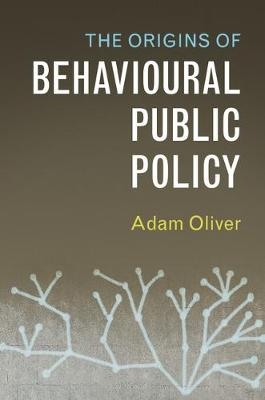
The Origins of Behavioural Public Policy
Seiten
2017
Cambridge University Press (Verlag)
978-1-316-64966-4 (ISBN)
Cambridge University Press (Verlag)
978-1-316-64966-4 (ISBN)
This book is an introduction to how behavioural economics is used to inform policy developments. Academics, policy makers and practitioners with a diverse disciplinary backgrounds, including political science, sociology and anthropology, will benefit from this book, as will general readers with an interest in behavioural public policy.
The use of behavioural science to inform policy is one of the main developments in the social sciences over the last several decades. In this book, Adam Oliver offers an accessible introduction to the development of behavioural public policy, examining how behavioural economics might be used to inform the design of a broad spectrum of policy frameworks, from nudges, to bans on certain individual behaviours, to the regulation of the commercial sector. He also considers how behavioural economics can explain and predict phenomena as a challenge to economists' assumptions around how people perceive time, utility and money. The book offers an intellectual foundation for all those concerned with behavioural public policy, from academics, undergraduate and postgraduate students with a diverse range of disciplinary perspectives, such as economics, political science, sociology and anthropology, to policy makers and practitioners working directly with behavioural public policy in their everyday working lives.
The use of behavioural science to inform policy is one of the main developments in the social sciences over the last several decades. In this book, Adam Oliver offers an accessible introduction to the development of behavioural public policy, examining how behavioural economics might be used to inform the design of a broad spectrum of policy frameworks, from nudges, to bans on certain individual behaviours, to the regulation of the commercial sector. He also considers how behavioural economics can explain and predict phenomena as a challenge to economists' assumptions around how people perceive time, utility and money. The book offers an intellectual foundation for all those concerned with behavioural public policy, from academics, undergraduate and postgraduate students with a diverse range of disciplinary perspectives, such as economics, political science, sociology and anthropology, to policy makers and practitioners working directly with behavioural public policy in their everyday working lives.
Adam Oliver lectures on behavioural economics and public policy at the London School of Economics and Political Science. He is the Editor-in-Chief of the journal Health Economics, Policy and Law, and Co-Editor-in-Chief of Behavioural Public Policy. He has published widely in the areas of behavioural economics and policy, including Behavioural Public Policy (Cambridge, 2013).
Preface; 1. Assuming rationality; 2. Challenging rationality; 3. Describing risky behaviours; 4. About time; 5. Experiencing and remembering; 6. Motivational crowding; 7. Nudges; 8. Shoves and budges; 9. Give and take; 10. Summing up; Note on references; Bibliography.
| Erscheinungsdatum | 29.04.2017 |
|---|---|
| Zusatzinfo | Worked examples or Exercises |
| Verlagsort | Cambridge |
| Sprache | englisch |
| Maße | 151 x 228 mm |
| Gewicht | 320 g |
| Themenwelt | Sozialwissenschaften ► Politik / Verwaltung ► Staat / Verwaltung |
| Wirtschaft ► Volkswirtschaftslehre ► Mikroökonomie | |
| Wirtschaft ► Volkswirtschaftslehre ► Wirtschaftspolitik | |
| ISBN-10 | 1-316-64966-0 / 1316649660 |
| ISBN-13 | 978-1-316-64966-4 / 9781316649664 |
| Zustand | Neuware |
| Informationen gemäß Produktsicherheitsverordnung (GPSR) | |
| Haben Sie eine Frage zum Produkt? |
Mehr entdecken
aus dem Bereich
aus dem Bereich
Organisationen steuern, Strukturen schaffen, Prozesse gestalten
Buch | Softcover (2024)
Rehm Verlag
CHF 53,20


